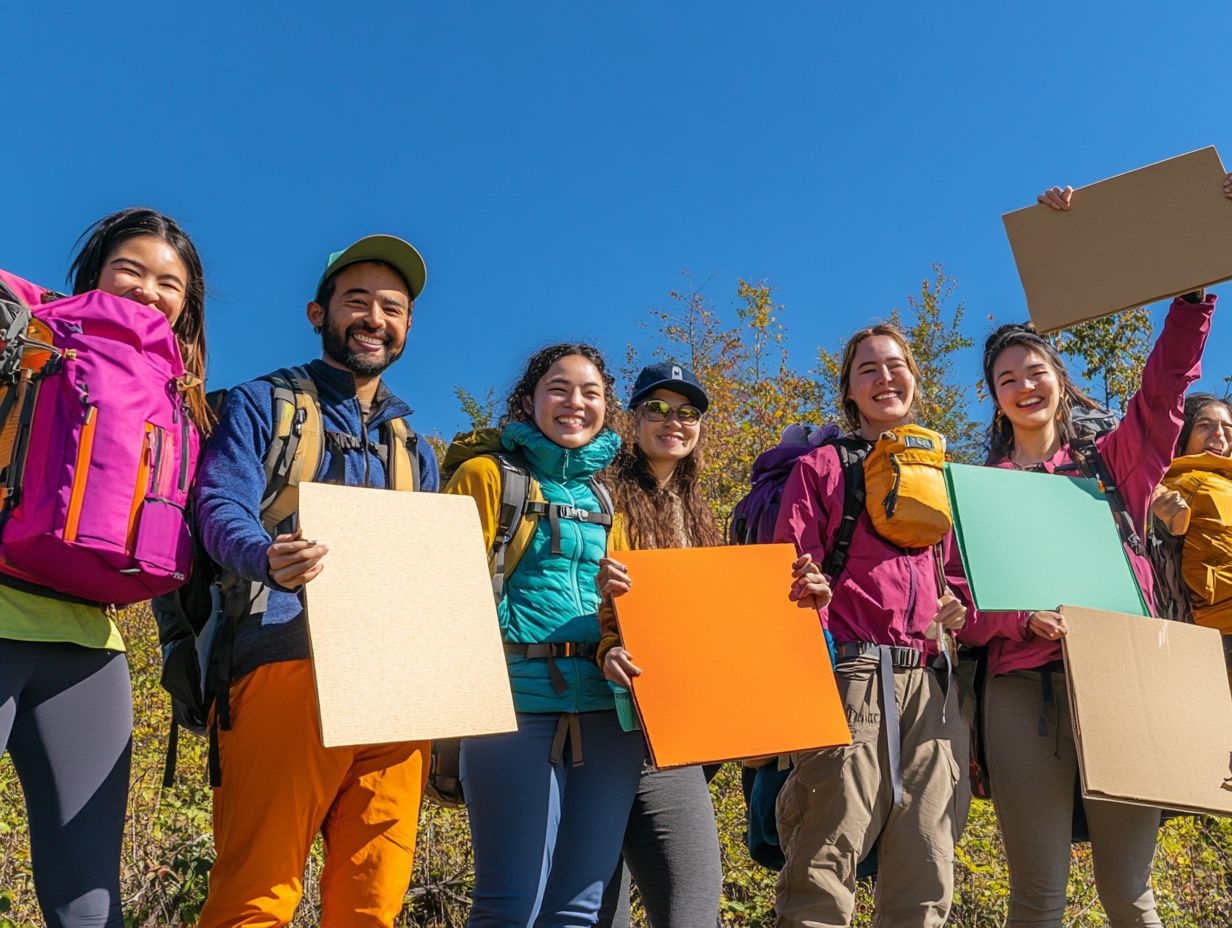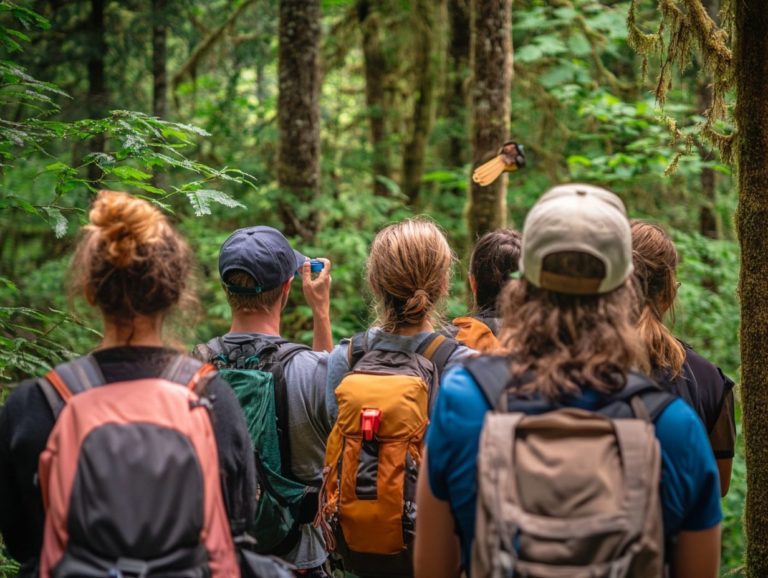How to Advocate for Responsible Travel
Travel can be a transformative experience, offering you the chance to immerse yourself in new cultures and witness breathtaking landscapes.
However, it also comes with responsibilities that go beyond personal enjoyment. It’s essential to understand how your journeys impact the environment and local communities.
This article delves into the significance of responsible travel, providing you with actionable ways to support local economies, respect cultural differences, and minimize your environmental footprint.
Join the movement! You can make a meaningful difference as a traveler.
Contents
- Key Takeaways:
- The Importance of Responsible Travel
- Ways to Advocate for Responsible Travel
- Educating Yourself and Others
- Taking Action: How to Make a Difference
- Frequently Asked Questions
- What is responsible travel and why is it important to advocate for it?
- How can I advocate for responsible travel?
- Why choose responsible travel over traditional travel?
- How can I encourage others to promote responsible travel?
- What challenges come with advocating for responsible travel?
- How to keep advocating for responsible travel after my trip?
Key Takeaways:

- Be conscious of the impact of travel on the environment and local communities.
- Support local economies and respect cultural differences while traveling.
- Educate yourself and others about responsible travel options.
- Take action through volunteering and supporting organizations.
The Importance of Responsible Travel
Responsible travel plays a crucial role in today s interconnected world. It nurtures sustainable practices that uplift local communities, reduce environmental impact, and support a thriving tourism industry.
Choose eco-friendly transportation. Understand the importance of cultural heritage sites to leave a positive legacy with your travels. This ensures your adventures align with the global sustainable tourism movement championed by organizations like the World Tourism Organization.
Through your commitment to responsible travel, you can bolster community-based tourism initiatives that enhance local economies and embrace the rich cultural diversity our planet has to offer.
Understanding the Impact of Travel on the Environment and Communities
Traveling is undeniably enriching, but it comes with a significant responsibility. When too many tourists visit a place, harming its environment and local life, it can threaten conservation efforts and diminish the quality of your travel experiences.
Take cities like Venice and Barcelona. The influx of visitors can overwhelm local infrastructure and degrade the very heritage that draws you in. This disrupts the everyday lives of residents and strains the resources essential for conservation initiatives.
To combat these effects, embracing responsible travel practices is key. Opt for off-peak visits, support local businesses, and participate in eco-friendly tours. These choices help distribute tourist load more equitably and preserve the natural and cultural treasures for future generations.
By making small yet impactful decisions, you can contribute to a more sustainable tourism model that benefits local communities and protects the environment.
Ways to Advocate for Responsible Travel
Advocating for responsible travel requires a thoughtful approach that weaves together ethical storytelling, bolsters local economies, and promotes sustainable practices at luxury resorts and community-based tourism initiatives.
By embracing this multifaceted strategy, you contribute to a more enriching and conscientious travel experience.
Supporting Local Economies
Supporting local economies through responsible travel is essential for enhancing tourism revenue. This ensures that you contribute positively to the communities you visit, especially by engaging with local markets.
When you consciously choose to explore local markets and artisan shops, you re not just acquiring unique handcrafted goods; you re enabling local artisans to thrive, creating jobs, and sustaining cultural heritage.
Research indicates that in regions like Bali, Indonesia, responsible tourism practices generate up to 30% more income for local businesses compared to traditional tourism models. This is vital for supporting local markets.
Engaging with local food markets can also have a remarkable impact. In Mexico, culinary tourism has led to a 15% increase in economic benefits for local vendors, boosted by initiatives from organizations like The Travel Foundation.
By taking these actions, you foster a sense of community and encourage sustainable practices, ensuring that the charm of these destinations is preserved for future generations.
Respecting Cultural Differences

Respecting cultural differences is fundamental to responsible travel. It enables you to appreciate cultural heritage sites and engage meaningfully with local communities through ethical storytelling.
By embracing this approach, you transform your experiences from mere sightseeing into deep and meaningful experiences. When you explore ancient temples in Southeast Asia, observe customs like dressing modestly. Participate in local rituals with genuine reverence.
Engaging with artisans in markets supports the local economy and fosters authentic interactions that deepen your understanding of the community’s values and history.
Being aware of local traditions and etiquette ensures that your visits to historic palaces in Europe or indigenous lands in North America are respectful. They also contribute positively to the preservation of cultural identity.
Minimizing Environmental Impact
Act now to minimize your environmental impact while traveling! This is crucial for promoting sustainability. Make thoughtful choices like eco-friendly transportation and conscious travel practices that support conservation efforts.
Choose public transport or rent a bicycle to explore your destination. Not only does this reduce carbon emissions, but it also offers a more authentic travel experience.
Opt for accommodations that prioritize sustainability, such as eco-lodges hotels designed to have minimal environmental impact or hotels with green certifications. This ensures your stay has a positive impact on local ecosystems.
Be mindful about conserving water and indulge in local, organic dining options to enhance your commitment to responsible travel. Additionally, learning how to be a responsible tourist can elevate your experience. Participating in local conservation projects or eco-tours gives you the power to play an active role in preserving the natural beauty that originally drew you in.
Educating Yourself and Others
Educating yourself and those around you about responsible travel is essential for cultivating a culture that embraces sustainable options. This approach respects local communities and enhances your travel experience, creating positive connections that benefit everyone involved.
Researching and Choosing Responsible Travel Options
Researching and selecting responsible travel options is essential for travelers who aim to make informed decisions that benefit local communities while adhering to sustainable practices and regulations.
By looking into various resources like travel blogs focused on eco-friendly tourism or platforms such as EarthCheck and Green Key, you can uncover accommodations and activities that prioritize environmental stewardship, including insights on the role of social media in responsible travel.
Engaging with local organizations offers valuable insights into culturally respectful practices, enriching your understanding of the destination. It’s also important to grasp specific travel regulations that promote sustainability, such as carbon offset programs that help balance out the carbon emissions from your travel, as well as guidelines for wildlife interactions and Destination Stewardship Center standards.
This knowledge elevates your travel experience and ensures each journey contributes to the conservation of natural resources and the well-being of local societies, while also learning how to encourage others to travel sustainably.
Sharing Knowledge and Encouraging Others to Travel Responsibly
Sharing your knowledge and encouraging others to travel responsibly can significantly enhance the impact of sustainable travel initiatives. By highlighting the benefits for local communities and the importance of ethical storytelling, you can make a meaningful difference.
In a world increasingly conscious of its ecological footprint, utilizing platforms like social media can be pivotal in spreading awareness. Create engaging content that showcases your personal experiences and best practices to attract like-minded travelers who share your passion for responsible exploration. Additionally, understanding the importance of eco-conscious travel education can enhance your efforts.
Writing blogs allows you to dive deeper into destinations, fostering a rich connection to their cultural significance. Additionally, exploring responsible travel practices can enhance your understanding. Hosting events or workshops can unite communities to discuss sustainable practices, creating a collaborative environment for change.
When ethical storytelling is woven into these efforts, it raises awareness and inspires collective actions that promote responsible travel. This encourages others to plan a sustainable travel itinerary, benefiting both people and the planet.
Taking Action: How to Make a Difference

You can make a meaningful impact in the world of responsible travel by engaging in sustainable travel programs, supporting organizations committed to ethical tourism, and advocating for policies and practices that promote responsible travel.
Your involvement can truly shape a more conscientious approach to exploring the world, creating a positive legacy for future generations.
Volunteering and Participating in Sustainable Travel Programs
Volunteering and participating in sustainable travel programs can profoundly enrich your travel experience while positively impacting local tourism projects and local development.
By engaging in these meaningful programs, you immerse yourself in local cultures. You forge authentic connections as you contribute to conservation efforts, wildlife protection, or community education.
Opportunities abound globally. Whether you re working with indigenous communities in the Amazon rainforest or assisting with beach clean-ups in Southeast Asia, such initiatives provide you with a sense of purpose.
These experiences educate you on the importance of preserving natural resources and cultural heritage. This not only fosters responsible tourism practices but also benefits both you and the host communities. For more insights, check out how to travel responsibly, ensuring your travels leave a lasting, positive mark.
Supporting Organizations and Initiatives
Supporting organizations and initiatives that champion responsible travel is a proactive way for you to contribute to conservation efforts and empower local communities through ethical tourism practices.
By engaging with travel companies that prioritize sustainability, you can ensure that your journeys leave a positive mark on the world. Organizations like the Global Sustainable Tourism Council and Leave No Trace provide invaluable resources and guidelines to help you minimize your ecological footprint. Additionally, consider promoting biodiversity through eco-conscious travel to further enhance your impact.
These initiatives encourage you to respect local cultures, support local economies, and actively take part in preserving natural habitats. Collaborating with local communities fosters deeper connections and understanding. This leads to sustainable outcomes that benefit both you and the residents you encounter.
Advocating for Responsible Travel Policies and Practices
Advocating for responsible travel policies and practices is essential to shaping the tourism industry toward sustainable travel. It ensures compliance with regulations that protect local communities and environments.
By actively engaging with policymakers and people or groups who have an interest in tourism, you can significantly influence the conversation surrounding sustainable tourism. It’s crucial for you to participate in community forums, support local organizations that champion eco-friendly initiatives, and stay informed about legislation affecting the travel industry. Additionally, adopting the top sustainable travel practices to follow can further enhance your impact.
Consider writing letters to your representatives, signing petitions, and sharing your insights on social media to amplify your voice. Collaborating with fellow travelers to promote ethical travel choices and support businesses that prioritize sustainability can create a ripple effect, encouraging more responsible behaviors throughout the industry!
Frequently Asked Questions
What is responsible travel and why is it important to advocate for it?

Responsible travel, also known as sustainable travel, focuses on minimizing negative impacts on the environment, culture, and economy of a destination. It is important to advocate for responsible travel to ensure that our travels do not harm the places we visit and to promote positive change for local communities.
How can I advocate for responsible travel?
There are several ways to advocate for responsible travel:
- Support local businesses.
- Choose eco-friendly accommodations.
- Respect the local culture and customs.
You can also spread awareness about responsible travel through social media or by joining organizations that promote sustainable tourism. Join the movement for responsible travel today!
Why choose responsible travel over traditional travel?
Responsible travel offers a more authentic and meaningful experience. It positively impacts the destination and helps preserve its natural and cultural resources for future generations.
How can I encourage others to promote responsible travel?
Lead by example! Share your experiences and tips for responsible travel with others.
Organize community events or workshops to educate people about the importance of responsible travel and how they can make a difference.
What challenges come with advocating for responsible travel?
Changing the mindset of travelers used to traditional travel is a big challenge. It s also tough to balance promoting responsible travel with necessary economic growth in tourism.
How to keep advocating for responsible travel after my trip?
Share your travel experiences and encourage others to travel responsibly. Support local initiatives that promote sustainable tourism.
Make small changes in your daily life, like reducing waste and choosing sustainable products, to positively impact the environment.






